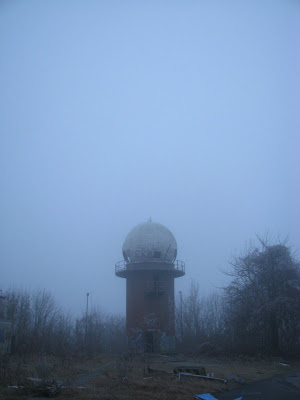
As we approached the demonstration, a Palestinian kid about ten years old stopped us, asking for IDs. He was playing the Israeli soldier to Israelis. I showed him my passport with a smile, not realizing what a complicated game of national identities was yet awaiting me.
We came to East Jerusalem to protest with the Palestinians. In the neighborhood of Sheikh Jarrakh, several families were kicked out of their homes to make room for extremist right-wing Israeli settlers. This is only a part in a scheme to "Jewify" East Jerusalem and enhance Israeli control of it. I'll leave the history of this scandal and its legal aspect to greater experts. My story today is one of symbols.
As we joined the great crowd that gathered in the neighborhoods soccer field, several flags were already flying, most were Palestinian, a few were red. The political left takes the cause of human rights here and elsewhere and I respect it for that. However, when more communist-inclined groups arrived, all of them sporting crimson flags, I started expecting Tovarich Lenin to come onstage and greet the proletariat masses.

In one corner, a woman was giving out blue and white flags with the word "shalom" (peace) replacing the hexagram of the Israeli flag. I decided to pick up one of these.
The first person to approach me over the flag was a Palestinian kid, about the same age as the joker who inspected me earlier. He was dying to hold it. I let him wave it a bit and show it off to his friends, then took it back. There were only four or five such flag in a crowd of 3500 people. I didn't want the kid to vanish with it. The demonstration was a cooperation and it was important to show that. If the TV cameras only caprute red, black, white and green, the Israeli public would feel estranged from the cause and the struggle would achieve little.

Next I was approached by a group of Palestinians in their 20s. "Get rid of this flag" a woman said to me, "get rid of your fucking shitty zionist occupation flag right now I tell you."
"Let's talk about this" I suggested.
"No, this is not open to dialogue. You are going to get rid of this flag right now. We are from the neighborhood and you are in our neighborhood now."
I lowered the flag out of respect for the locals, but on second thought and with some encouragment from friends, raised it again. Another Palestinian came over with similar tones, accompanied by an Israeli activist carrying a red flag.
"Put the flag away", the Palestinian demanded.
"Ok," I said. "But I don't have another flag. My country may have become ugly, but it's my only country and this flag is my only way of stating that I am here too and that Israelis support the struggle. Waving it here is my only way of trying to infuse it with new meaning. not an occupation flag, but one that can also represent opposition to the occupation."
They found the idea of infusing blue and white with new meaning laughable. After 40 years of occupation, the Israeli flag seems to be beyond hope.

"It's all I have," I repeated, "You don't like it, give me another flag." I was secretly hoping the Palestinian would remove the kaffiya he wore as a scarf and hand it to me, symbolically inviting me to join him shoulder to shoulder in the struggle. Instead, it was the Israeli who handed me the red flag.
"Stalin!" I retorted.
"What!?" he acted offended, "I am a communist, Stalin is my biggest enemy, he hijacked the values of communism to benefit his murderous totalitarian regime."
"This is the same thing Netanyahu and Lieberman are doing to Israel," I suggested. "If the red flag can be waved despite Stalin, the Israeli flag can be waved despite them, and don't tell me that Stalin is dead and that the occupation is still going on. People are still opressed under this flag all over China, North Korea, Transnistria, Cuba..."
"Listen," he said, "In Israel I would wave this flag proudly, but not here, east of the green line."
"I'm the opposite. I would never wave it in Israel. There I'll be taken as just another supporter of our augmenting fascism, but here, where everybody knows what I stand for, I would."
"Have it your way," said the Israeli, ready to seal the argument. Some other Israeli activist, a girl, hastened to add: "I just want to see you wave this flag after getting beaten up by soldiers and tortured by the Shin Bet. Why don't you try that and see if afterwards you still want to wave this flag".
"I understand what you're saying" I told her, "and that the flag scares and offends some people here, but you're not pragmatic. For things to change we need to be here together and try and influence public opinion. You don't want things to change! all you want is to be radical and beautiful in your own eyes!" It finally happened, I lost my temper. The Palestinian already vanished into the crowd, looking for someone less hopeless.
Onstage, Palestinian playwright and theatre director Samih Jabarin was attacking those waving blue and white flags. Afterwards Israeli activist Elisheva Milikovski came on and apologized to the public, saying the demonstration was inclusive of everyone who wanted to support the cause.
I remained there confused, with my flag at half mast, until the same little Palestinian kid appeared again, his eyes asking for it. I handed it to him and he ran gladly directly to the heart of the flag jungle. His flag was not captured by the media cameras. The demonstration, which was attended mostly by Israelis and was the largest mixed demonstration in a decade, was taken for another Palestinian gathering and didn't even make the front page of Haaretz.

Later that night I did get to hold a kaffiyah, a Palestinian friend handed it to me in a Shiekh Jarrakh restaurant, but my spirit was low. It was hard to see the Judean People's front and the People's Front of Judea fueding like this. We're doomed to our flags just as we're doomed to this situation. I hope to God we can somehow fold all of our differences away and make progress.

 P.S. Within minutes of publishing this post, top notch poet and editor Eli Hirsh added his two cents. He tells that in many Israeli communities in which chametz is difficult to obtain, passover has become the holiday of baking homemade bread. If anynoe needed proof that the restrictions beat the purpose - you've got it. Hirsh suggests mixing both baking experiences. I certainly have enough of an apetite to deal with that.
P.S. Within minutes of publishing this post, top notch poet and editor Eli Hirsh added his two cents. He tells that in many Israeli communities in which chametz is difficult to obtain, passover has become the holiday of baking homemade bread. If anynoe needed proof that the restrictions beat the purpose - you've got it. Hirsh suggests mixing both baking experiences. I certainly have enough of an apetite to deal with that.







































